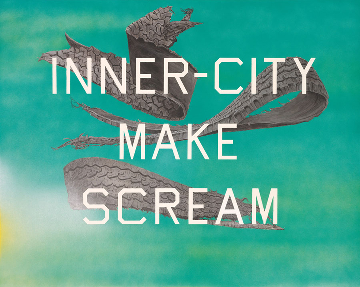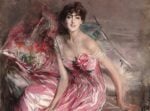Ed Ruscha

Gagosian Gallery Roma è lieta di presentare una mostra di nuovi dipinti di Ed Ruscha.
Comunicato stampa
Deterioration is a fertile area to explore.
—Ed Ruscha
Gagosian Rome is pleased to present new paintings by Ed Ruscha.
In 2005, Ruscha represented the U.S. at the Biennale di Venezia with Course of Empire, a project inspired by five paintings by Thomas Cole which depicted the same landscape over time as it transforms from a pristine natural state into developed terrain, and, finally, barren desolation. In the elegiac Psycho Spaghetti Westerns of 2011, he continued this train of thought, zooming in on the effects of time on the contemporary American landscape in a manner both empirical and metaphorically charged. He described these finely nuanced exercises in perception and memory as "waste and retrieval."
In these wide horizontal paintings, landscape became a mental construct of abutting abstract surfaces—one a sfumato backdrop, the other a representational ground (grass, scrub, rock). This structure—a strong diagonal cutting the picture plane and dividing background from foreground—is a pictorial device that Ruscha has often used, dating back as far as the Standard Station paintings of the 1960s. In the Psycho Spaghetti Westerns it provided a near-neutral picture plane for meticulously rendered nature mortes of incidental roadside trash—"gators" (tire shreds), beer cans, construction materials, packaging, and discarded bedding. In keeping with the historical painting genre, they provide reflection on time passing.
In his most recent paintings, Ruscha continues to meditate on the melancholy of Psycho Spaghetti Westerns in complex pictures that conflate his signature elements with the visual devices, perspectival techniques, and refined atmospheres of Old Master paintings to depict the romantic road trip of youth reduced to roadside dystopia. In Gators, meticulously rendered life-size images of tire blow-outs float like botanical specimens against a blank white background; in the delicately shaded crimson-to-white field of Hydraulic Muscles, Pneumatic Smiles, similar fragments hover behind that vertically set phrase, deftly conjoining machine and man. In Bliss Bucket, a painting that owes as much to Surrealist precedent as to reality, a shabby mattress with rumpled bedding—perhaps a makeshift refuge—lies enigmatically beneath a giant musical bar with treble clef, cunningly foreshortened to add depth and perspective to the picture plane.
Ruscha's deadpan representations of archetypal signs and symbols distill the imagery of popular culture into cinematic and typographical codes that are as accessible as they are profound. His wry and sometimes obtuse choice of words draws upon the moments of incidental ambiguity implicit in the interplay between language and image. Although his inspirations are undeniably rooted in his close observation of American vernacular, his elegantly laconic paintings, drawings, prints, photographs, and artists' books speak to more complex and widespread issues regarding the appearance, feel, and function of the world and our tenuous and transient place within it.
A fully illustrated catalogue with an essay by Alex Kitnick and a text by Bob Monk is forthcoming.
Ed Ruscha was born in Omaha, Nebraska in 1937 and studied painting, photography, and graphic design at the Chouinard Art Institute (now CalArts). His work is collected by museums worldwide. Recent solo museum exhibitions include "Witty Wonders from Anagrams to Gunpowder and All the Parking Lots on Sunset Strip," Whitney Museum of American Art (2004); the drawing retrospective "Cotton Puffs, Q-Tips®, Smoke and Mirrors," which toured U.S. museums in 2004-05; "Ed Ruscha," MAXXI, Rome (2004); "Ed Ruscha: Photographer," Jeu de Paume, Paris (2006, traveled to Kunsthaus Zurich; and Museum Ludwig, Cologne); "Ed Ruscha: Fifty Years of Painting," Hayward Gallery, London (2009, traveled to Haus der Kunst, Munich; and Moderna Museet, Stockholm); "Ed Ruscha: Road Tested," Modern Art Museum of Fort Worth, Texas (2011); "On the Road," Hammer Museum, Los Angeles (2011, traveled to Denver Art Museum, Colorado; and Museum of Contemporary Art, Miami); "Reading Ed Ruscha," Kunsthaus Bregenz, Austria (2012); "Artist Rooms on Tour: Ed Ruscha," Tate Gallery, London (2012, traveled to Hatton Gallery, Newcastle University, Newcastle upon Tyne, England); "Ed Ruscha: Standard," Los Angeles County Museum of Art (2012-13, traveled to Rose Art Museum, Brandeis University, Waltham, MA); "Ed Ruscha: Los Angeles Apartments," Kunstmuseum Basel (2013); "Ed Ruscha: Books and Paintings," Brandhorst Museum, Munich (2013); and "In Focus: Ed Ruscha," J. Paul Getty Museum, Los Angeles (2013). Ruscha represented the United States in the 51st Venice Biennale (2005). In 2012, he curated "The Ancients Stole All Our Great Ideas" at Kunsthistorisches Museum Wien.
Edward Ruscha Catalogue Raisonné of the Paintings: Volume Six, 1998–2003 and Edward Ruscha Catalogue Raisonné of the Drawings: Volume One, 1956–1976 were published by Gagosian earlier this year.
For further inquiries please contact the gallery at +39.06.4208.6498 or at [email protected]. All images are subject to copyright. Gallery approval must be granted prior to reproduction.
Press Enquiries
Francesca Martinotti
E. [email protected]
T. +39.348.7460.312
www.francescamartinotti.com
Please join the conversation with Gagosian Gallery on Twitter (@GagosianRome), Facebook (@GagosianGallery), Google+ (@+Gagosian), Instagram (@gagosiangallery), and Tumblr (@GagosianGallery) via the hashtags #EdRuscha #GagosianRome.
Inaugurazione: giovedì 20 novembre, dalle ore 18 alle 20
Il deterioramento è un terreno fertile da esplorare.
—Ed Ruscha
Gagosian Gallery Roma è lieta di presentare una mostra di nuovi dipinti di Ed Ruscha.
Ruscha ha rappresentato gli Stati Uniti alla Biennale di Venezia del 2005 con Course of Empire, un progetto ispirato all'omonimo ciclo del pittore americano Thomas Cole (1801–1848), raffigurante la trasformazione di un paesaggio nel corso del tempo: da una originale condizione di pura naturalezza, a luogo industrializzato, a terreno arido e desolato. Nel corpus Psycho Spaghetti Westerns del 2011, Ruscha continua a sviluppare la poetica di queste riflessioni, concentrandosi sul deterioramento del panorama americano contemporaneo, sia a livello empirico che metaforico. Un delicato esercizio di memoria e percezione che ha definito "spreco e recupero".
Negli ampi dipinti orizzontali di questa serie, il paesaggio diventa un vero e proprio concetto teorico di piani astratti e contigui—da una parte lo sfondo sfumato e dall'altra il primo piano figurativo (prato, boscaglia, roccia)—tagliati da una diagonale decisa. Questa soluzione pittorica utilizzata spesso dall'artista, già dalla serie Standard Station del 1960, qui si trasforma in un palcoscenico pittorico neutrale su cui si stagliano nature morte iperrealiste, rifiuti quali brandelli di pneumatici ("gators"), lattine di birra, materiali da costruzione e imballaggio, materassi abbandonati: alterazioni della realtà per cause naturali o sociali.
Nei lavori più recenti in mostra a Roma, Ruscha prosegue la meditazione malinconica della serie Psycho Spaghetti Westerns attraverso immagini complesse che fondono i suoi segni distintivi con le tecniche pittoriche e le atmosfere raffinate dei Grandi Maestri del passato, trasformando il romantico viaggio on the road della giovinezza in un panorama distopico sul ciglio della strada. In Gators pneumatici scoppiati, rappresentati meticolosamente a grandezza naturale, fluttuano come esemplari botanici su uno sfondo completamente bianco; in Hydraulic Muscles, Pneumatic Smiles frammenti simili si librano dietro la scritta omonima su un fondo porpora sfumato in bianco, creando abilmente il legame uomo-macchina. In Bliss Bucket, un dipinto ispirato tanto al Surrealismo quanto alla realtà, un materasso logoro con lenzuola sgualcite—forse un rifugio di fortuna—giace enigmaticamente al di sotto di una grande battuta musicale con chiave di violino, posta ingegnosamente di scorcio per aggiungere profondità e prospettiva alla raffigurazione in piano.
Con imperturbabili rappresentazioni di simboli e segni archetipici, Ruscha sintetizza l'immaginario della cultura popolare in codici cinematografici e tipografici tanto accessibili quanto profondi. La sua pungente e talvolta criptica selezione di parole attinge agli episodi di ambiguità accidentale propri dell'interazione tra linguaggio e immagine. Sebbene le sue fonti d'ispirazione siano innegabilmente radicate nell'osservazione da vicino del gergo americano, i suoi dipinti, disegni, fotografie, e libri d'artista, elegantemente laconici, esplorano temi più complessi e universali, quali l'apparenza, la percezione, lo scopo del mondo e della nostra evanescente e transitoria presenza in esso.
Un catalogo illustrato sarà pubblicato in occasione della mostra e comprenderà un saggio di Alex Kitnick e un testo di Bob Monk.
Ed Ruscha è nato a Omaha, Nebraska nel 1937 e ha studiato pittura, fotografia e graphic design presso l'Istituto d'Arte Chouinard (ora CalArts). Le sue opere sono parte integrante delle principali collezioni museali nel mondo. Tra le personali più importanti si annoverano: "Witty Wonders from Anagrams to Gunpowder and All the Parking Lots on Sunset Strip," Whitney Museum of American Art (2004); "Cotton Puffs, Q-Tips®, Smoke and Mirrors," retrospettiva di disegni che tra il 2004 ed il 2005 è stata in mostra in diversi musei statunitensi; "Ed Ruscha," MAXXI, Roma (2004); "Ed Ruscha: Photographer," Jeu de Paume, Parigi (2006, e successivamente alla Kunsthaus, Zurigo; al Museum Ludwig, Colonia); "Ed Ruscha: Fifty Years of Painting," Hayward Gallery, Londra (2009, successivamente presso l'Haus der Kunst, Monaco e il Moderna Museet, Stoccolma); "Ed Ruscha: Road Tested," Modern Art Museum of Fort Worth, Texas (2011); "On the Road," Hammer Museum, Los Angeles (2011, successivamente al Denver Art Museum, Colorado; e al Museum of Contemporary Art, Miami); "Reading Ed Ruscha," Kunsthaus Bregenz, Austria (2012); "Artist Rooms on Tour: Ed Ruscha," Tate Gallery, Londra (2012, successivamente alla Hatton Gallery, Newcastle University, Newcastle, Inghilterra); "Ed Ruscha: Standard," Los Angeles County Museum of Art (2012-13, successivamente al Rose Art Museum, Brandeis University, Waltham, Massachusetts); "Ed Ruscha: Los Angeles Apartments," Kunstmuseum Basel, Basilea (2013); "Ed Ruscha: Books and Paintings," Brandhorst Museum, Monaco (2013); e "In Focus: Ed Ruscha," J. Paul Getty Museum, Los Angeles (2013). Nel 2005 Ruscha ha rappresentato gli Stati Uniti alla Biennale di Venezia e nel 2012 ha curato "The Ancients Stole All Our Great Ideas" al Kunsthistorisches Museum di Vienna.
Edward Ruscha Catalogue Raisonné of the Paintings: Volume Six, 1998–2003 e Edward Ruscha Catalogue Raisonné of the Drawings: Volume One, 1956–1976 sono stati pubblicati da Gagosian Gallery all'inizio di quest'anno.



